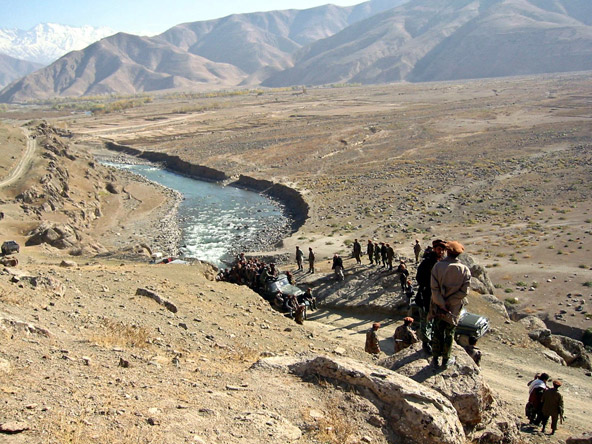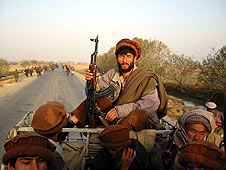
November, 2001. Outside Farkhar, Afghanistan. Tribal fighters loyal to Daoud Khan prepare to take Taloqan.
Photo: Phillip Robertson
Tupolev 154
Under the great belly of the Air Tajikistan jet, the journalists, aid workers, and diplomats get the tightening of the skin and the copper taste in their mouths as the future rushes across brain-stems and makes them forget everything but this exact moment.
This flight is the only direct air connection from Western Europe to Dushanbe, and it is full, not just with people, but dangerously overloaded with equipment and supplies. Inside, the stewardesses have turned down every other row of seats to force passengers to sit farther back to make sure the nose of the aircraft will get off the ground. Cameras, computers, and suitcases take up the rear of the plane, the excess luggage spilling into the aisles. Flies drift around the cabin in clouds, landing on the flowers in the upholstery. Female members of the cabin crew wear pillbox hats with veils to cover their hair, handing out plastic cups with Soviet orange drink, indifferent and bored, trying to avoid contact with the passengers, marching up and down the aisles in their scuffed shoes. They are no different than the Americans. Just before takeoff, when I'm halfway through the orange drink, Terry MacCarthy from Time magazine leans over with a piece of information. "You know, these things go down all the time." It's true. He said it because I was a tourist. The Tupolev 154, the battered workhorse of the Soviet air fleet, has a penchant for going down in flames, and if that doesn't work out, it finds a way to break up in mid-air, leaving wreckage scattered over wide areas of countryside. For the Tupolev, there has been at least one crash a year, and rarely are there survivors.
While flying at 2800 feet, the aircraft suddenly made a 180 degree and plunged to the ground. The plane was scheduled to land at Irkutsk as an intermediate stop to refuel. Preliminary indications are that all three engines failed at once. Or the Quito incident, August 29, 1998: The aircraft crashed and burned during takeoff. The crew had tried and failed twice to take off. On the third attempt, the plane started to gain altitude, rising a few feet but settled back to the earth plowing past the end of the runway and coming to rest in a soccer field in a smoldering ruin.
There is the long moment where the pilot throttles up and we wait for the nose to come up and the rest of the plane to clear the runway. Everyone holds their breath, and MacCarthy looked bad as it rattled and slowly gained speed. We are presented with the possibility that we will die before getting to the war. Then we are in the air and the Air Tajikistan flight leaves the green skirts of Europe flying south and east over Turkey, avoiding Afghan airspace, flying a northern course over an ochre and barren Turkmenistan and Uzbekistan before landing in Dushanbe at six in the morning on the fourth of November. We have come to rest on a high plain below the Zeravshan mountains. Already the world is no longer the world. The passengers have to give up their passports and visas to the Tajik secret police waiting by the plane's exit. There is no explanation. They just take the documents and disappear.
Once all the passengers are off the plane, armed guards escort everyone to the one room terminal and lock the doors, stationing a man with a rifle at each exit. The soldiers wear their Soviet uniforms and make an attempt to be menacing, but don't quite fill them out all the way. The soldiers also make sure that no one makes the mistake of thinking that they care about the arrivals one way or the other. They make an English economist who is confined to a wheelchair wait outside in the freezing cold while they process his papers. The smokers smoke. The line inches along. A man with a broad face turns to ask me a question. He's on a talking jag. Later on he'll tell me that his colleague is carrying twenty thousand dollars in his pocket. Off to the side of the room, a Tajik security official pushes a French journalist around.
"You know what this is like?"
"What?"
"It's just like Captain fucking Scarlet!" I look at him.
"You mean to tell me you don't know Captain Scarlet, because I can tell that you don't from that look."
"Sorry."
"Can you believe it Des? He doesn't know Captain Scarlet. Your education is sorely lacking. Well, with the Captain Scarlet show you have this house, right, a house, and it has the coolest thing, which is a floor that completely retracts, right, while a new floor slides in, with couches and tables and lamps and a whole set of furniture? And the Mysterons are his enemies, these blokes here are a lot like Mysterons, did I already say that?" He goes on, the whites of his eyes visible.
"Who do you work for, man?"
"Oh, what? APTN."
"Who's that?" The security police now have my passport in a special pile from the rest.
"Don't ask me what it stands for, because I don't fucking know. All I know is that it's a pretty impressive acronym."
When it was my turn, the security men stamp the passport and wave me through. Outside after confinement in the plane we are born into the crystalline daylight, drugged with adrenalin and fatigue. The camera man disappears and the Christian missionary who told me about his clandestine work in Afghanistan drifts off and doesn't want to be associated with me. The war is close but not close enough. The terminal building is a forgotten Soviet ruin but the November air coming through the doors is sharp and cold and clean.
Outside, several hundred Tajiks are waiting for the foreigners to emerge from the terminal, all begging to be hired as drivers, translators and fixers. When I walk through the doors, people in the crowd grab at my arms and I have to yell at them and push them away, but they are gentle enough. They roil and surge as the Westerners come through the doors. Tajikistan is the poorest of the Central Asian states, since it has no marketable natural resources. Its citizens are desperate.
 LEAD IMAGE: 26 November 2001. Kunduz, Afghanistan. Northern Alliance fighters on the road to Kunduz.
LEAD IMAGE: 26 November 2001. Kunduz, Afghanistan. Northern Alliance fighters on the road to Kunduz.Photo: Phillip Robertson
© Phillip Robertson, 2009-2020.
